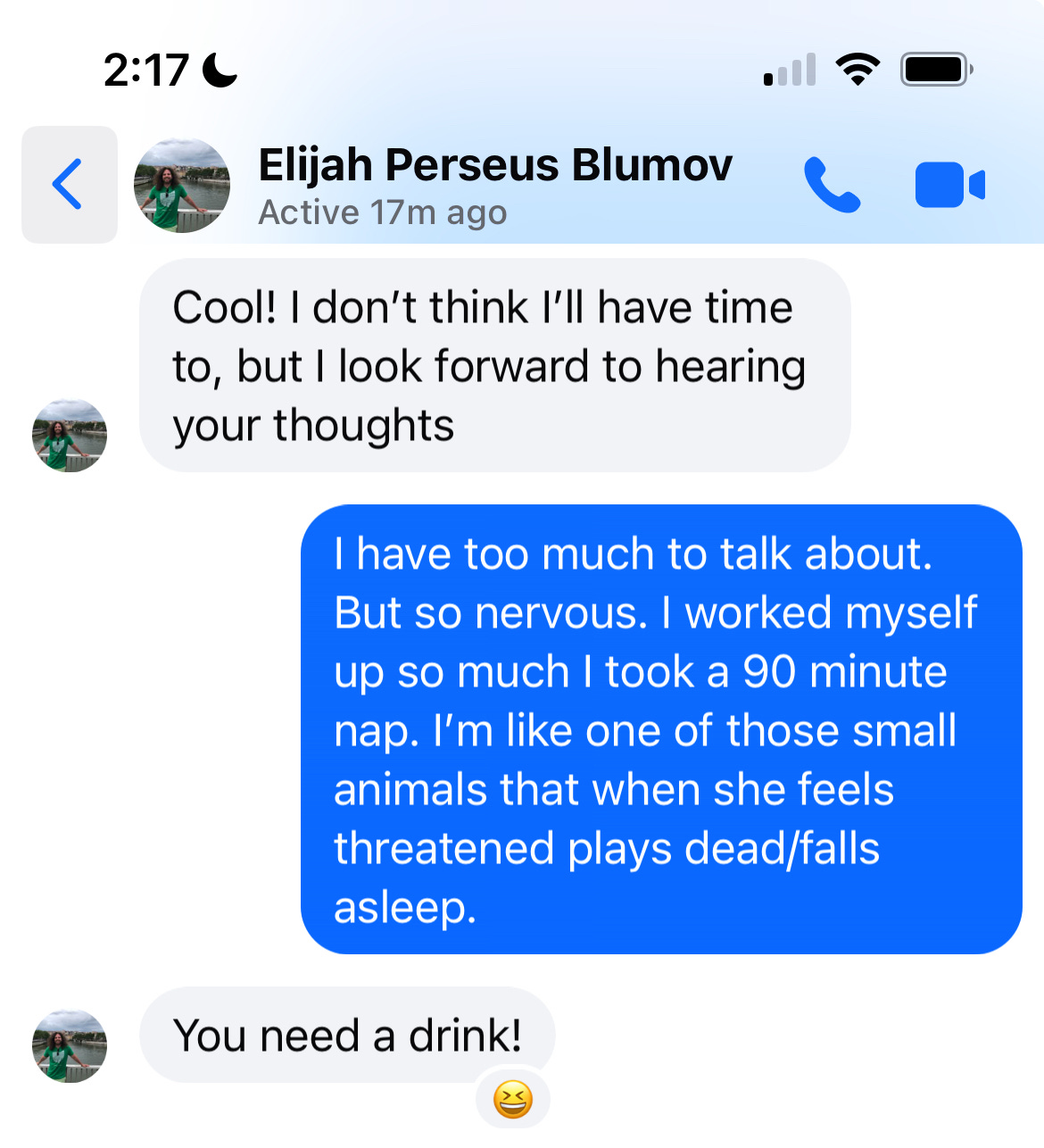Monumental Verse and the New Sublime
A poetry conversation with Chained Muse’s David Gosselin and Versecraft’s Elijah Blumov. On narrative poetry, where patronage comes from, and more. Poetry by Wilbur, Robinson, Stallings, and Carter.
Hello, friends. I have something different to share, and I hope you find it interesting.
from Substack invited me and for a conversation about poetry. We ended up speaking for close to 3 hours about a wide range of topics.That is how this epic conversation went:
If you liked our discussion, it would be great if you could share it with others.
David opened things up with a discussion about Elijah’s essays on New Verse Review, “The Iron Lyre” and “The Monumentalist Manifesto” and we went on to talk about how a poem does not have to be epic or drama in order to be good. We go over the power of narrative poetry. Both Elijah and I brought poems by E.A. Robinson to illustrate our points: Elijah had “The Clerks" and "Many Are Called", and I read what is likely his most well known poem, “Richard Cory”. (If you liked what we had to say about E.A. Robinson, you might be interested in this article by Brian Brodeur about Robinson’s gift of narrative compression.)
Behind the scenes…
I was a bit nervous. In fact, this was the exchange between me and Elijah before the recording:
Should I have had a drink?
And because I am ever so slightly neurotic I’ll mention these notes…
There is an obvious break in the middle of the recording where Elijah and I are chatting, and we didn’t necessarily know if this was going to be part of the show. I elaborate a little about the Reagan speech after the Challenger disaster. The poetic language is actually borrowed from a sonnet by John Gillespie Magee Jr. called “High Flight”:
Oh! I have slipped the surly bonds of Earth And danced the skies on laughter-silvered wings; Sunward I've climbed, and joined the tumbling mirth of sun-split clouds,—and done a hundred things You have not dreamed of—wheeled and soared and swung High in the sunlit silence. Hov'ring there, I've chased the shouting wind along, and flung My eager craft through footless halls of air .... Up, up the long, delirious, burning blue I've topped the wind-swept heights with easy grace Where never lark, or even eagle flew— And, while with silent lifting mind I've trod The high untrespassed sanctity of space, Put out my hand, and touched the face of God.
(Public domain)
I am glad that I got to read the last stanza of A.E. Stallings’ “Empathy” again. It is an incredible poem, and I did rush the first reading a bit. Thanks to David for letting me go over it again.
I know Richard Wilbur’s poetry in my sleep, especially “The Writer” — a fumbled a bit, but I promise you I know it cold.
I knew I mispronounced Josef Pieper’s name the moment it flew out of my mouth. *doh* (Leisure: The Basis of Culture is one of my most read books on my shelf.)
Toward the end of our discussion, Elijah, David, and I find out that we have something in common (listen to find out what that is), and I mention
’s new book, Weep, Shudder, Die: On Opera and Poetry.1As per my usual, I’m enthusiastic about The Catherine Project which has also had a huge impact on my intellectual life. Through their courses I have learned Latin and studied Homer, Aristotle, Virgil, and Sophocles and more. This summer I am co-leading a short course on Geoffrey Hill’s Tenebrae.2
I hope to write more about The Reaper Essays later. I had prepared to say more prior to the show, but we just ended up talking about many other things. I am glad I was about to read Jared Carter’s “The Gleaning” — an incredible narrative poem that many people have not heard. It is in the book of essays.
When we talked about poetry events I mentioned that
at / Inkwell is already having events featuring poetry, art, and music, much like what had mentioned.I was mistakenly said that A.E. Stallings had an erasure poem in Like. I meant to say a “found poem” which is very different. Both styles use external texts as sources for their poems.
I also mentioned Substack. A lot. It really has been a great place for me, and it’s where I’m obviously communicating with you now… so there ya’ go.
Here is my post about how we could make poetry more personal:
Mixtapes Will Save Poetry
·I want to write something in response to a recent group text. I just registered for the Frost Farm Poetry Conference in August and told them how excited I was about the poss…
About my discussion partners…
is a poet, translator and critic based in Montreal, Canada. You can find him on his Substack, The Chained Muse, and on his YouTube channel of the same name. He also publishes The New Lyre literary journal.
is a poet, critic, and host of Versecraft, an excellent podcast that explores the art of poetry through the craft of some of the world's best but most underrated poems. If you wanted to meet him in person, he will be an instructor at the Frost Farm Poetry Conference in Derry, NH. His workshop is entitled “O for a Voice Like Thunder!: The Grand Style in English” and it should be very good.
Let me know if you actually were able to listen to our monumental recording.
Did you agree or disagree with anything that we said?
What did you think of the poems we shared? Would you have mentioned other examples?
I’d love to hear your comments!
Apologies for mentioning Gioia’s name incessantly. He likely has had as much influence on me as Schiller has had on David. LOL
Here’s Elijah’s Versecraft episode on one of Geoffrey Hill’s poems.







You give so much insight in all you do whether it's reading, being interviewed, sharing perspective, analysis. Your posts could be curated into a book!
Carter’s “The Gleaning” is in his second book, After the Rain (1993). In a blurb on the back, Gioia places the book in the tradition of Frost. And certainly this poem, of a class of poems I might term “everyday tragedies,” hearkens back to Frost’s terrifying “‘Out, Out—’.”
The highlight of After the Rain is the 17-page “Barn Siding”: another accident, another story.